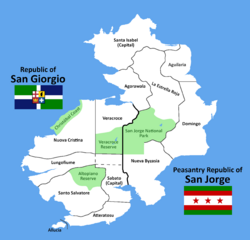San Jorge: Difference between revisions
m (→Demographics) |
mNo edit summary |
||
| Line 123: | Line 123: | ||
== Etymology == | == Etymology == | ||
{{ | {{main|San Giorgio#Etymology}} | ||
WIP. This is section likely going to be identical to etymology of [[San Giorgio]]. To fit with a Peasantry Republic and its eco-socialism, we can stress the farmer-aspects of the name “George.” | WIP. This is section likely going to be identical to etymology of [[San Giorgio]]. To fit with a Peasantry Republic and its eco-socialism, we can stress the farmer-aspects of the name “George.” | ||
| Line 149: | Line 149: | ||
* 23 April 1300 — Mantellan explorers landed on the island of Saint George. | * 23 April 1300 — Mantellan explorers landed on the island of Saint George. | ||
* Iberos and Mantella had several colonial skirmishes. One of these resulted in Mantella having to sell half of the island of Saint George to Iberos. The Iberics established their own colony of | * Iberos and Mantella had several colonial skirmishes. One of these resulted in Mantella having to sell half of the island of Saint George to Iberos. The Iberics established their own colony of San Jorge. | ||
* San Jorge is an ex-[[Red Iberos|Iberos]] colony on the eastern side of the island of Saint George.<ref>[https://www.europans.com/topic/6188-v5-map-europa-discussion/?do=findComment&comment=40018764 The Eupocalypse] (15 December 2021)</ref> | * San Jorge is an ex-[[Red Iberos|Iberos]] colony on the eastern side of the island of Saint George.<ref>[https://www.europans.com/topic/6188-v5-map-europa-discussion/?do=findComment&comment=40018764 The Eupocalypse] (15 December 2021)</ref> | ||
* 1951 — Revolution against the old kingdom took place. (Which “old kingdom” is that?) Peasantry Republic has been in power since. San Jorge was reorganised in the 1950s and 1960s to be primarily farmers and herders. Imagine a socialist society, but where everyone owns a plot of land and are expected to farm it sustainably and maintain bio-diversity. Santa Isabel was exempt as the administrative region of San Jorge. | * 1951 — Revolution against the old kingdom took place. (Which “old kingdom” is that?) Peasantry Republic has been in power since. San Jorge was reorganised in the 1950s and 1960s to be primarily farmers and herders. Imagine a socialist society, but where everyone owns a plot of land and are expected to farm it sustainably and maintain bio-diversity. Santa Isabel was exempt as the administrative region of San Jorge. | ||
Revision as of 09:27, 3 October 2022
Peasantry Republic of San Jorge República Campesina de San Jorge (Iberic) | |
|---|---|
|
Flag | |
 Map of San Jorge (east) and San Giorgio, their subdivisions, and national parks. | |
| Capital | Santa Isabel |
| Official languages | Iberic |
| Ethnic groups (2022) | Iberic, Jieen |
| Demonym(s) | Jorgen |
| Government | Eco-Socialist Republic |
• Secretary of State | Hector Fidalgo |
| Area | |
• | 10,584.42 km2 (4,086.67 sq mi) |
| Driving side | right |
This article or section is in the process of an expansion or major restructuring. You are welcome to assist in its construction by editing it as well. If this article or section has not been edited in several days, please remove this template. If you are the editor who added this template and you are actively editing, please be sure to replace this template with {{in use}} during the active editing session. Click on the link for template parameters to use.
This article was last edited by Orioni (talk | contribs) 2 years ago. (Update timer) |
San Jorge, officially known as the Peasantry Republic of San Jorge (Iberic: República Campesina de San Jorge), is a sovereign state in Marenesia on Eurth. Its closest neighbouring country is San Giorgio to the west. Santa Isabel is the capital and largest city. San Jorge is approximately 10,584.42 km2 (4,086.67 sq mi) in size, without the territorial waters. The island is home to $number inhabitants.
(1st paragraph. Name. Location. Borders. Approx population and size. Capital city.)
(2nd paragraph. Political system. Short history in 1 sentence. Link with present in 1 sentence. Head of state.)
(3rd paragraph. Economy in 2 sentences. International relations in 1 sentence.)
Etymology
WIP. This is section likely going to be identical to etymology of San Giorgio. To fit with a Peasantry Republic and its eco-socialism, we can stress the farmer-aspects of the name “George.”
Geography
WIP
- The capital city is Santa Isabel.
- Subdivision (A-Z): Agorawala, Aguilaria, Domingo, La Estrella Roja, Nueva Byzasia, Santa Isabel (Capital).
- National park (A-Z): San Jorge National Park.
History
(WIP How did your current nation come to be? What were its previous incarnations? Was it part of a union with a neighbour? Which events shaped the way it is today?)
- 23 April 1300 — Mantellan explorers landed on the island of Saint George.
- Iberos and Mantella had several colonial skirmishes. One of these resulted in Mantella having to sell half of the island of Saint George to Iberos. The Iberics established their own colony of San Jorge.
- San Jorge is an ex-Iberos colony on the eastern side of the island of Saint George.[1]
- 1951 — Revolution against the old kingdom took place. (Which “old kingdom” is that?) Peasantry Republic has been in power since. San Jorge was reorganised in the 1950s and 1960s to be primarily farmers and herders. Imagine a socialist society, but where everyone owns a plot of land and are expected to farm it sustainably and maintain bio-diversity. Santa Isabel was exempt as the administrative region of San Jorge.
- Present — Hector Fidalgo is 48 years old and has been in power for the last 7 years, taking over from his father Luka Fidalgo.
Politics
(WIP. President is first in command, the Secretary would be second. San Jorge isn't a democracy despite calling itself a republic. It's an anocracy with both autocratic and democratic elements if we're going by a Secretary/President situation. One-Party state. Though we could relabel it to a One-Party Eco-Socialist State Due to the nature of iiWiki I do have to call it a republic, as that's what San Jorge identifies as.)
Hector Fidalgo is the 9th Secretary of State of San Jorge, and the current leader of the Jorge Rural y Partido Socialista Campesino (JRPSC). The JRPSC is the current ruling party in the legislative assembly.
- Political parties
| Secretary of State | Term of office | Election(s) | |||
|---|---|---|---|---|---|
| No. | Portrait | Name (Birth–Death) |
Took office | Left office | |
| 1 | 
|
Julián Pérez (1910-2010) |
1951 | - | 1951 |
| 2 | 
|
José Francisco (1910-1981) |
1960s | 1960s | 1960s |
| 3 | 
|
César Aromeu (1916-1970) |
1960s | 1960s | 1960s |
| 4 | 
|
João Aromeu (1922-2020) |
1970s | 1970s | 1970s |
| 5 | 
|
President 5 (1936-2000) |
1980s | 1980s | 1980s |
| 6 | 
|
President 6 (1934-1999) |
1990s | 1990s (keep in mind he died in 1999) | 1990s |
| 7 | 
|
President 7 (born 1959) |
1990s | 2001 | 1990s |
| 8 | 
|
Luka Fidalgo (born 1945) |
2001 | 2015 | 2001 |
| 9 | 
|
Hector Fidalgo (born 1974) |
2015 | Incumbent | 2015 |
Economy
WIP
Demographics
WIP
- Dixit Xio: “I had in mind that San Jorge was largely ethnically homogenous. Though idm if you want to reference Iberos taking prisoners of war or slaves from Azania to the island.”
Cultures
WIP
References
- ↑ The Eupocalypse (15 December 2021)




